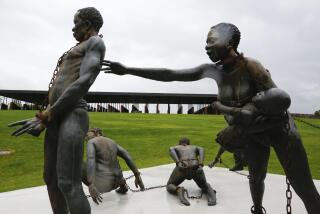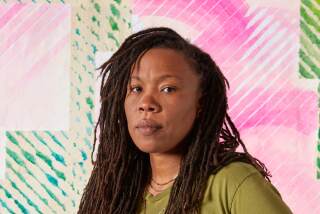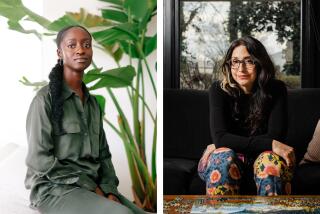COLUMN ONE : A Meeting of Black and White : A suburban homemaker and a working mother experience each other’s world in South Africa. Fear gives way to friendship.
- Share via
TEMBISA, South Africa — Sue Ingram felt sick with fear. She didn’t know where she would sleep or what she would eat. She imagined bugs crawling around her feet and throngs of black people who might resent her, even kill her.
Her bags stood beside the door of her warm, secure home. She had packed carefully, nothing too fancy but nothing too casual, either.
She took a last look at herself in the mirror: She was 55 years old, a descendant of the first white settlers in South Africa, the product of a life of white privilege. And she was about to take her first step into a black township. She quickly put on some rouge to hide the pale fear.
Half an hour later she was in Tembisa, her throat burning from the haze of coal smoke. Crowded taxi-vans sped past. Thousands of blacks walked the dirt paths.
Ingram rubbed the rouge from her now-flushed face and began to think that maybe her friends had been right all along. Maybe this was a foolhardy mission. But it was too late to turn around.
Down a rutted dirt road, past an overflowing trash bin and houses with only candles for light, she found Joyce Mkuwane’s house.
“Thank you, Sue, for coming to my home,” Mkuwane said. “And thank you for not thinking we’re animals.”
So began an emotional and eye-opening voyage for two ordinary women, one white and one black, across generations of fear and distrust in South Africa.
Black and white leaders are talking to each other as equals these days about the country’s future. But deal-making alone cannot bridge the divide carved by 42 years of legal racial segregation and centuries of master-servant relationships. Closing that gap begins not with news conferences and formal agreements but with people like Sue Ingram and Joyce Mkuwane, in places like Tembisa.
Tembisa is a sprawling ghetto of 450,000 people, one of the satellites created by South African social engineers as a repository of cheap black labor for the white-run factories and homes of Johannesburg. Like most townships, Tembisa is hidden from the main thoroughfares and the eyes of white motorists. It is not on the way to anywhere.
Joyce Mkuwane lives here with her husband, Thomas, a son and daughter-in-law and a granddaughter. A large woman with a gap-toothed smile, Joyce is 48 years old, the mother of three and the owner of several day-care centers. Thomas is a supervisor for the state-run bus company, where he started out as a driver 18 years ago.
Their home stands in a barren tract with thousands of look-alike concrete houses known as “matchboxes,” each with four rooms and an outdoor toilet. But the Mkuwanes have used their money and carpentry skills to expand their matchbox to 10 rooms that cover their small plot of land.
When Sue Ingram stepped through the front door, she found Thomas watching television in a living room overstuffed with soft furniture, plants and paintings. It was “nice and warm, clean-smelling,” Ingram remembers.
“Oh, but this is beautiful,” Ingram told her hosts and added, modestly, “I’m afraid to have you come to my house. I don’t have all the nice things you have.”
Ingram lives 10 miles away on a quiet, middle-class street in Germiston, an industrial suburb of Johannesburg. The road in front of her house is paved, and no two houses are alike. The manicured lawns and lush shade trees are protected by short fences and private security company signs that promise a quick “armed response” to reports of prowlers.
Ingram, a small, thin homemaker, is also the mother of three grown children. Her husband, Bob, now retired, was a supervisor with the state-run airline.
She had decided to visit Tembisa when she saw an item in the church program one Sunday morning about a weekend “Christian encounter” between whites and blacks in the township.
“When I read that, my heart gave a little jump,” Ingram remembers. She showed it to her husband, who said, “That’s for you.”
Soon after she had signed up, though, Ingram began to have doubts. Concerned friends asked her again and again: Was she sure it was the right thing to do? Could the actions of one person really make any difference in South Africa?
Ingram had to admit that the closest she had come to a township was when she drove past the grass huts of South Africa’s rural black homelands. Her first thought had always been, “I hope the car doesn’t break down.”
Making her decision more difficult was a pamphlet being circulated in the townships that urged blacks to rise up and kill whites. Anti-apartheid leaders had condemned it, and many thought it the work of right-wing whites trying to stir up trouble for the government. But it was hard to ignore because, as Ingram said, “it was all written down.”
As the date of the encounter approached, Ingram twice changed her mind about going. She became a nervous wreck, crying over the most insignificant things.
“I was ashamed of myself for being scared,” she said.
In the end, faith, or maybe fatalism, saw her through. Whatever happened, she figured, the Lord was on her side. If only that would be enough.
Most of her worries began to fade the first night, when she sat down for dinner in Tembisa. Joyce covered the table with chicken and mealie pap, a thick maize-meal porridge that is the staple of most African meals. Thomas decreed that the family would speak only English during Sue’s stay.
“It was amazing, really,” she recalled. “They were chatting to me as if I was one of them.”
One thing that worried her was the Mkuwanes’ neighbors. She was afraid that they would see the white house guest and make trouble for the Mkuwanes later. But Joyce reassured her that “nothing like that will happen.”
As midnight approached, Ingram tried to explain, over coffee and dessert, why she had decided to come.
“I wanted to see,” she said. “You’re never too old to learn.”
Later, Mkuwane turned the living room sofa into a bed for her guest. “I stay here when Tommy and I have a fight,” she said with a conspiratorial laugh.
Ingram giggled. “I do that at home sometimes, too,” she said.
The next morning Mkuwane put a kettle on the stove for tea, and the two women chatted leisurely like old friends.
“They don’t rush anything,” Ingram said later. “When they start rushing is when they’re too late already. They just live .”
The Mkuwanes own a car, but the purpose of the encounter was to introduce their visitor to life in a township, so Joyce and Ingram walked two blocks to the taxi stand. Black strangers waved, and Ingram, with her host’s tutoring, began greeting people in Zulu--” Sabona “ for one person and “ Sabonane “ for a crowd.
The women squeezed into one of the private taxi vans that carry millions of blacks to work each day. Ingram was nervous, but she tried not to let it show.
“You’re in this black taxi with all these black people, and I guess you’re a bit scared that they might turn on you or something,” Ingram said.
Walking the streets of Tembisa and riding taxis turned out to be “much safer than I thought,” she said, adding: “But there are still some blacks who look at you with eyes of hate. They hate white people because of apartheid.”
As Ingram and Mkuwane talked, they discovered that they shared many of the same values and concerns about life, but differences in their background and experience were apparent, too. They didn’t talk much about those.
Joyce Mkuwane had spent most of her life as a nurse, working in whites-only hospitals and white homes, seeing the inequities of apartheid up close.
“Our blacks know about whites,” she said. “But whites don’t know blacks at all.”
She quit work at a private, multiracial hospital when she overheard two white doctors discussing the death of a brain-damaged black child.
“That’s minus one garden boy,” she quoted one of the doctors as saying with a shrug.
One of her most vivid memories was the bloody uprising of 1984-85.
“If the police saw four of us on the street, they would start shooting,” she said. “I didn’t know from one day to the next whether my children would come home alive.”
Although she didn’t admit it to Ingram, Mkuwane said, she remains “a little bit bitter” about the way whites have treated blacks. “But in my heart of hearts,” she said, “I want to make friends with whites. I wish more whites wanted to make friends with us.”
Sue Ingram, on the other hand, had seen little of the effects of apartheid. She grew up on a farm near Johannesburg. Her father, a construction foreman, moved the family to the city when she was 13. She married and raised her children in an environment of white schools, white hospitals, white neighborhoods, even white parks.
Although she supported racial reform in South Africa, the only blacks Ingram knew were her maid, her neighbors’ maids and the black customers at the pharmacy where she worked for a time. She remembers those black customers as “very proud people” who always insisted, against her recommendation, on buying goods with the highest prices even when similar, less expensive goods were available.
“I don’t think they trusted us,” she said.
In their long talks, Ingram and Mkuwane tiptoed into politics, to which so many conversations in South Africa eventually turn. But both were wary of the terrain.
“I wanted to make her feel at home, to be accepted, so I tried to avoid talking about anything I knew would worry her,” Mkuwane said.
She was particularly concerned that Ingram might be shocked by some of her radical opinions, such as her belief that whites should invite their black maids to the dinner table, and her deep suspicion that the government’s recent reforms are “just more tricks.”
“I used to be the sort of person who just succumbed” to the system, Mkuwane told a reporter later. “But now I’m very revolutionary. If I know my rights, I stand up for them.”
Ingram too held back some of her innermost thoughts. She did not tell Mkuwane, for example, of her deep concern that a black government would run whites out of South Africa.
But Ingram admitted to her host that she felt guilty “because of the way you have been treated, being pushed into places like Tembisa. Even if you put a dog in a pigsty, that dog is going to live like a pig very soon.”
Ingram said later she suspected that Mkuwane would support a quick black takeover of power in South Africa.
“I don’t blame her,” Ingram said. “But some of the blacks blame everything on the whites, and it’s not our fault. It’s our forefathers’. But that’s the past. Many of us want it to be different now.”
On Ingram’s last night in Tembisa, Mkuwane got an urgent call from a friend, a black councilor in the township. The councilor was worried that radical young blacks, who regard the council as an instrument of white oppression, were planning to attack her home. Mkuwane and Ingram rushed to the councilor’s house. It was late, and Ingram was frightened.
“I was looking for a place where I could hide,” Ingram said. “They offered to take me back, but I said, ‘I’m in it with you, so I might as well stay.’ But I was thinking, ‘Yes, please take me home.’ ”
It turned out to be a false alarm. But when they got home, Ingram swallowed one of the tranquilizers she had packed.
“My poor heart,” Ingram said. “Even an hour after taking that tablet, my heart was still beating fast.”
On Sunday morning, Ingram’s last day in Tembisa, the Mkuwanes were running late for church. Joyce still had to take a bath and iron her dress, so Ingram offered to do the ironing.
“It was the strangest thing,” she said. “I thought, ‘Here I am ironing a black girl’s dress. The first time in my life.’ It was unreal.”
Ingram was one of 80 whites who signed up for the Tembisa encounter, but 20 dropped out at the last minute under pressure from worried friends and family. Barry Poppleton, the organizer, said he had many more blacks volunteering to be hosts than whites willing to be guests.
“It’s very sad,” Poppleton said. “There’s so much positive happening in South Africa today, but there is still a lot of fear, too. And getting together is the only way to prepare people for the social transformation that is coming.”
Rain fell that Sunday afternoon, and Ingram and Mkuwane said goodby to each other with a long hug in the rain.
“I love Sue,” Mkuwane said. “I only wish there were more whites like her.”
Ingram was more hopeful. “At least there were a few pink faces in Tembisa,” she said. “And we have something to tell our friends about.”
A day later, Sue Ingram picked up the phone in her white neighborhood and placed a call to her new friend, Joyce Mkuwane. Just to say hello.
More to Read
Sign up for Essential California
The most important California stories and recommendations in your inbox every morning.
You may occasionally receive promotional content from the Los Angeles Times.














